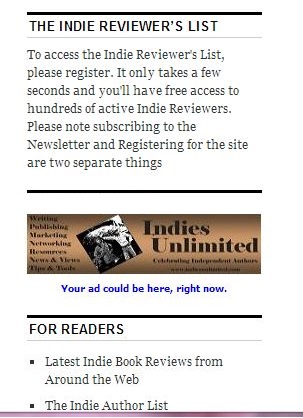 Love may make the world go round and money can’t buy me love. Even though some call it the root of all evil, I still find myself looking for ways to obtain more of that filthy lucre. If you have a website or blog, the eyeballs of your visitors are worth money. There are various ways to monetize your website. The most obvious and least intrusive is as an affiliate of Amazon or other vendors. If you have links to products on these websites, getting a cut when you send someone from your site who subsequently makes a purchase, seems like a no-brainer. But what about other options to pick up a little extra? Today I’m going to discuss advertising, focusing on Project Wonderful, one specific option to sell ad space on your site and also a way for authors and publishers who want to advertise to find potential sites on which to advertise. Continue reading “Maybe Not Wonderful, but Okay”
Love may make the world go round and money can’t buy me love. Even though some call it the root of all evil, I still find myself looking for ways to obtain more of that filthy lucre. If you have a website or blog, the eyeballs of your visitors are worth money. There are various ways to monetize your website. The most obvious and least intrusive is as an affiliate of Amazon or other vendors. If you have links to products on these websites, getting a cut when you send someone from your site who subsequently makes a purchase, seems like a no-brainer. But what about other options to pick up a little extra? Today I’m going to discuss advertising, focusing on Project Wonderful, one specific option to sell ad space on your site and also a way for authors and publishers who want to advertise to find potential sites on which to advertise. Continue reading “Maybe Not Wonderful, but Okay”
Author: Big Al
Book Vetter
 The best thing about self-publishing is that anyone can do it.
The best thing about self-publishing is that anyone can do it.
The worst thing about self-publishing is that anyone can do it
– Anonymous
I’ve yet to see anyone describe the perceived issue better than this anonymous commenter on my blog. The rise of a viable means of self-publishing has given anyone who wants to bypass the traditional gatekeepers and put their work out there a way to do so. Books that deserved to make it past the gatekeepers, but might not have in the past for reasons of marketability or just bad luck, are now getting a shot at finding their audience. But many also perceive a downside. In the past a reader could pick up a random book at their local bookseller or bring up a book’s page at their favorite online retailer, read the blurb, possibly check out the first few paragraphs, and if the story appealed to them they could purchase it with the assurance that all aspects of the book would almost always meet some minimum quality standard. Continue reading “Book Vetter”
Genre: Good or Evil
 A couple months ago T.D. McKinnon wrote a post for Indies Unlimited that discussed literary fiction versus genre fiction. He also mentioned “…the increasing number of genre labels that sometimes seem to me a little obscure, with the assignment to the various categories certainly more subjective than objective.” In this post, I’m going to discuss genre labels, a bit about their history (at least as I see it), their positives and any negatives.
A couple months ago T.D. McKinnon wrote a post for Indies Unlimited that discussed literary fiction versus genre fiction. He also mentioned “…the increasing number of genre labels that sometimes seem to me a little obscure, with the assignment to the various categories certainly more subjective than objective.” In this post, I’m going to discuss genre labels, a bit about their history (at least as I see it), their positives and any negatives.
As I see it, the purpose of genres is as a shorthand to classify a book’s content. It helps bookstores arrange books that are similar to be close together. In turn, this helps readers determine if a book is something they’re interested in or as a way to quickly focus in on the books that potentially fit what they’re looking for. Imagine visiting a brick and mortar bookstore where all the books were on the shelves arranged by author last name, ISBN, or some other method without first having them grouped into genre. Could you find what you were looking for? Genre has historically been one of the most critical factors in book discovery. If a potential reader can’t find your book, they can’t buy or read it. Continue reading “Genre: Good or Evil”
“Dialogue with Me,” He spouted
 One night over gruel the minions were kicking around possible subjects we could write about and someone suggested a post on dialogue. (I don’t remember who as I was busy knocking gruel thief Rich Meyer’s spoon away from my bowl. How I still manage to gain weight around here, I have no idea.) Anyway, I said that I couldn’t do a post on how to write dialogue. The amount I’ve written is roughly equivalent to the number of words in the lyrics to Tequila. But I thought I was more than capable of writing a post on how not to write dialogue. Or at least one telling you about some of the problems I’ve seen made in the indie books I’ve read. Here are three to look out for in the dialogue you write. Continue reading ““Dialogue with Me,” He spouted”
One night over gruel the minions were kicking around possible subjects we could write about and someone suggested a post on dialogue. (I don’t remember who as I was busy knocking gruel thief Rich Meyer’s spoon away from my bowl. How I still manage to gain weight around here, I have no idea.) Anyway, I said that I couldn’t do a post on how to write dialogue. The amount I’ve written is roughly equivalent to the number of words in the lyrics to Tequila. But I thought I was more than capable of writing a post on how not to write dialogue. Or at least one telling you about some of the problems I’ve seen made in the indie books I’ve read. Here are three to look out for in the dialogue you write. Continue reading ““Dialogue with Me,” He spouted”
